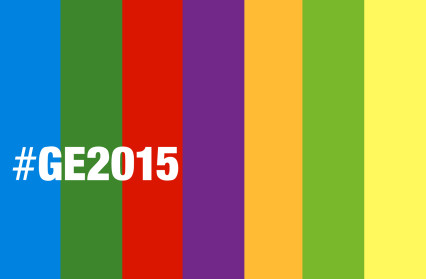The Rise of the Right | Ahead of this week’s General Election Ben Glover looks at the increasing popularity of the UK’s right wing parties.
Since the end of the Second World War there has been a caution by the political mainstream in the UK to identify themselves with policies that stray too far right off the middle ground. Ideas of equality and collectivism pervaded through a generation that had fought fascism and won, to the extent that Britain was considered a socialist state. Though, during this period of post-war consensus people and political organisations that openly described themselves as on the right gained some degree of notoriety, such as Enoch Powell, the National Front and British National Party, but the views they espoused were mostly just the vocalisation of the minority. Even though Margaret Thatcher’s government was economically neo-liberal and socially conservative, it has been argued that its’ policies and rhetoric were more classic libertarian in nature (following in the hefty footsteps of William Gladstone) rather than the in keeping with traditions of the right wing. However, in the last decade (possibly the last seven years to be more accurate) there has been a significant increase in mainstream political parties engaging with right wing politics.
The term ‘right wing’ is a slippery concept to pin down, since it has varied according to location, time and political persuasion. Originally derived from the Representative Assembly in France, pre-French Revolution (in which the aristocrats sat to the right of the king and the commoners to the left), its meaning has continually changed and evolved. Diverse, even conflicting, political ideas such as capitalism, fascism and religious evangelicalism have all at some point been considered right wing issues. Can groups as different the American Republican Party and Mussolini’s National Fascist Party both be considered to be on the right wing of the political spectrum?
Well, yes. The basis of all right wing ideologies is the inevitability of societal inequality and social stratification, normally established around concepts of tradition and natural law. Whether this inequality derives from economic capacity, religion, race or intellect, the right wing’s acceptance of it, defines their ideological (and therefore political) approach to policy making. Historically a rise in right wing sentiment is closely preceded by economic downturns and social strife.
Judging on these criteria, it is possible to identify many political parties and politicians in the UK whose initial premise is that of the right wing. The Conservative Party and UKIP offer the more populist face of the right wing dogma, while the BNP offer a range of policies that is worrying to anyone that values toleration and liberal political culture. Using the General Election results from 1997 onwards it is possible to see that the right wing share of the vote has appeared to be growing: those parties that identified themselves as right wing in 1997 received 33.7% of the vote; 2001 they dropped to 33.4%; 2005 it rose to 37.36%; and finally at the last election in 2010 they achieved 41.1%. It is worth noting that during local and European elections many of these right wing parties achieve even higher shares of the vote, partly down to protests votes against the current administration or due to single issues that achieve resonance amongst an active part of the electorate.
Though many of these smaller right wing parties have little chance of forming any part of the government in the coming weeks, their influence is still keenly felt across the country. The way that most smaller parties impact upon the mainstream of political discourse is not necessarily through electoral success, though this certainly does help, but it through the three traditional parties adopting their policies, stance or rhetoric to win back disenfranchised voters. For instance, the move by the big three parties to stave off any pressure on environmental issues by the Green Party in the 1990s, was to create their own green policies. This is now mirrored by how UKIP have defined many of the political battle grounds during the 2010 General Election, and this upcoming election, resulting in the main political parties moving towards the UKIP stance in order to nullify their chances electorally. Immigration and the European Union are now key topics in any debate, whereas before the financial crisis in 2008, and the subsequent recession, these were less important to the voter.
The most worrying aspect, for me at least, of the rise of the right is not their differing views on the size or role of the government in the UK. Nor is it their views on economic progress. These are both legitimate topics for discussion in any liberal parliamentary democracy and as such need to be constantly debated. No, the real issue for me is how the right wing’s (and I am looking at UKIP here) acceptance of inequality as the natural order has allowed the expression of frankly hateful remarks a political norm by the public. ‘You’re poor? – fuck you!’ ‘You’re from a different religion to me – fuck you!’ ‘You’re not the same race as me – fuck off back to your own country!’
The normalisation of this attitude as a genuine political philosophy is terrifying. Led by the Machiavellian and demagogic figure of Nigel Farage, UKIP have given a metaphorical political home to people that would have once supported the BNP or NF, and as such has semi-legitimised their prejudices against other groups in society. Only last week, Farage attempted to defend his supporters against the results of a YouGov poll which found that 28 percent of people identifying with UKIP held racist beliefs.
History has taught us that if the initial point for forming any political party or organisation is the belief that people in society are not equal, not deserving of equal access to all services or do not have equal rights, then the result is always division, resentment and eventually hatred. Please bear this in mind when voting tomorrow.
the rise of the right











